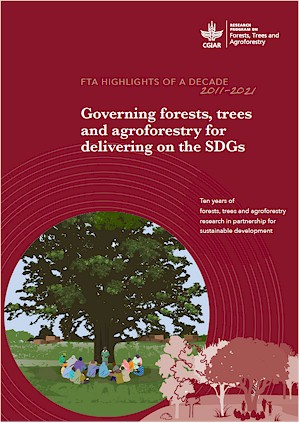| Book |
 |
|
| Title | Governing forests, trees and agroforestry for delivering on the SDGs. FTA Highlights of a Decade 2011–2021 series. Highlight No. 14 | | Author | Peter A Minang, Lalisa A. Duguma, Beria Leimona, Meine van Noordwijk, Delia Catacutan, Amy Ickowitz, Sonya Dewi, Feri Johana, Javed Rizvi, Sarmiento Barletti JP, Larson AM, Valentina Robiglio, Wainaina P, Bernard F, Mandiefe SP, Foundjem-Tita D, Cerruti PO, Mutune J, Do Trong Hoan, Alemagi D, Herry Purnomo, Gamma Galudra, Grace B.Villamor and Elok Mulyoutami | | Year | 2021 | | Number of Pages | 46 | | Call Number | BK00240-21 |
|
| Abstract: |
| This publication presents the results of FTA’s work across the humid tropics in the area of enhancing the good governance of forests, trees and agroforestry, typically as part of landscapes that deliver on sustainable development goals. Work on the interface of the science and policy arenas focused on enabling good governance in landscapes through five principles: legitimacy and voice, strategic direction, performance, accountability and fairness. This publication presents and discusses the main achievements in terms of contributions to research, innovation and actual impact on good governance at the landscape, subnational, national and supra-national levels. A decade of FTA involvement has contributed substantively to the development of national agroforestry policies in a number of countries, including India (the world’s first-ever national agroforestry policy) and Nepal. Maldives, Gambia, Kenya and Rwanda have also embarked on national strategies with FTA support. The Association of Southeast Asian Nations (ASEAN) has also adopted agroforestry guidelines. In Peru agroforestry concession schemes were introduced to formalize agriculture and timber production on forest lands as a means of reducing deforestation and forest degradation, and the country also adopted a comprehensive definition of agroforestry in its National Agricultural Policy. FTA also supported the development of national bioenergy strategies in Viet Nam and Kenya. The FTA program has also significantly influenced thinking on payment for ecosystem services, coinvestment in ecosystem service stewardship, incentives, community forestry and certification of forests and tree commodities worldwide. Green growth planning approaches have also been integrated into subnational-level planning in Indonesia and Viet Nam. Adoption of multi-stakeholder forum methodologies in forest landscape planning at subnational levels in Peru, as well as community forestry approaches in Cameroon and Indonesia, also show FTA’s contributions to methodological approaches. These results contribute to improved enabling institutional, political and socioeconomic environments for more effective and efficient natural resource management, and hence positively affect livelihoods in multiple countries across the humid tropics. |
|
|
Download file(s): Click icon to download/open file.
|
| |
File Size |
Description |

|
7292 KB |
Softcopy |
|
|
|
| Viewed in 236 times. Downloaded in 101 times. |